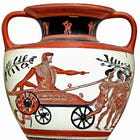It's not what you do, it's how you do it.
Have you ever questioned the inherent value of taking action and getting things done? We refer to main characters in adventure flicks as “action heroes,” but do you think action is heroic in and of itself?
The very first one was quaint, even cute—the opposite of a cinematic thrill ride. A shirtless man jogs across the Golden Gate Bridge, light guitar music swelling. You’d be forgiven if you thought this was a commercial for a healthy breakfast cereal, what with the gentle backing track, the muted sunrise, and the soft focus.
The camera centers on the elderly man’s genial face bobbing back and forth with each step as he explains how he runs 17 miles every morning. A flute or pan pipe chirps up over the guitar, and we learn he’s 80-year-old Walt Stack.
Walt deadpans, “People ask me how I keep my teeth from chattering in the wintertime.” The scene shifts to his sneakers trotting along. This break interjects comic timing that assures the punchline will land. His sly grin fills the screen again: “I leave them in my locker.”
The image dissolves to a simple black background framing a new branding concept in white lettering: “Just do it.”
This ad introduced Nike’s now-legendary slogan. Even by 1988 standards the ad is unexceptional as was the shoe company at the time, but the commercial marked the dawn of a new corporate powerhouse.
“Just do it” works as a slogan because it’s simple and satisfying. In three short words—just eight letters—Nike summed up what was missing in so many lives. I’ve written about how information alone isn’t enough to achieve anything. We need something beyond mere knowledge to succeed. What is that something? “Just do it.” Clear, direct, and vague enough not to threaten.
“Just do it” captures the essence of what people imagine when they think “leader.” We’re told that a leader is someone “who gets things done,” but that perception of the leader is as ridiculous as it is prevalent. After all, followers get things done too, as do individuals working on their own. The solitary groundhog that digs holes in my yard and attacks my garden every spring certainly gets things done, but is she a leader? The getting done does not a leader make.
And what is it that gets done exactly? That matters.
“Just Do It”: One Killer Slogan
What is the origin of the “just do it” slogan? Would you be surprised to learn that it sprung from the lips of a notorious murderer?
Nike based the slogan on the death-row statement of one Gary Gilmore, who was executed by firing squad in 1977. When asked for his last words, Gilmore replied, “Let’s do it.” A Nike executive somehow found enough inspiration in this terminal profundity to appropriate it. A little tweak to suit the Nike brand, and thus, Gilmore’s “Let’s do it,” was immortalized as “Just do it.”
“Just do it” has universal appeal. Gilmore—a man who apparently appreciated action right to the bitter end—epitomized just doing it as he robbed and murdered his victims. The firing-squad executioners also just did it as they pulled the triggers, thus bringing to an end a brutal criminal career. Think of that the next time you slip on your Air Jordans.
I’m not suggesting that Nike condones murder or even execution. In fact, let’s take Nike out of the picture altogether. Their slogan didn’t shape or even define the zeitgeist so much as articulate it in a pithy way. At that time, 1988, the globe was changing rapidly, with the Soviet Union collapsing and a new world order emerging. America was clamoring to get into the action, to “Just do it.”
“Just do it” disrupts the status quo, a quality it shares with leadership. On the other hand, leaders also know when to maintain the status quo—in other words, “Just don’t do anything.” And leaders know when to halt counterproductive actions: “Just stop doing it.” But, as we see with Gilmore, what you’re doing (or not doing) matters as well.
Furthermore, it’s not only the act of getting done and what gets done that makes the leader; it’s the how and why it gets done and where it goes from there. For instance, if you bully your way to achievement, you’re no leader. You certainly are taking action and succeeding, but bullying is the opposite of leadership.
So, when it comes to just doing it, we must consider several factors: who's doing it (an individual or a team?), what they're doing and why (is it values-based?), how they're doing it (again, values-based?), and what are the repercussions (both short and long-term)?
As a measure of leadership, “Just do it” must take all those questions into account.
When we thrill to the actions of people in charge without asking these questions, we run the risk of confusing just doing with actual leadership. To sum it up, you can’t be a hero in the cause of evil.
A Maniac of Action
No one would deny that Gary Gilmore was a man of action. On consecutive evenings in 1976 he robbed two people at their places of employment—college students with spouses and infants. He also killed them for no apparent reason. This escapade capped a lifetime of car theft, armed robbery, and assault. Did his active criminal career make Gilmore an action hero? Was he a leader? He certainly “got things done.”
I’m being a little flip here because I want to demonstrate the absurdity of how we think of leadership. For instance, we praise politicians who “take action” even when that action is reckless, counterproductive, and out-and-out dangerous. How many times have you heard some version of “At least they did something” as though doing something were de facto virtuous? All that seeming decisiveness feels good, right? But since when does feeling good equal being good?
Let’s try this statement on to see if it’s as comfortable: “At least Gary Gilmore did something.” I don’t know about you, but I find this instance a lot less satisfying. It makes me queasy.
It’s the same with bosses in the workplace. Just because they might get things done doesn’t mean what they’re doing or how they’re doing it is valuable at all. It may even be disastrous.
I won’t claim that bosses are homicidal maniacs, a la Gary Gilmore, but I’ve certainly detected the stench of antisocial proclivities emanating from some bosses I’ve known. They proudly displayed their dishonesty, bullying, cruelty, and corruption to anyone who cared to look. Naturally these monster bosses didn’t see it that way, which jibes with their overall pathology.
The bigger problem is that others—team members, peers, superiors, outside observers, and even victims—habitually ignore, condone, or justify bad bossing behaviors as well. Some proclaim, “They’re the boss. What can you do?” True enough, but—outside of a dictatorship—being the boss is not some sort of blanket pardon.
Others ignore their behaviors altogether, figuring the ends justify the means. “Look at the results,” they say, dismissing consequent mayhem as mere collateral damage. They tout the need to “make sacrifices” yet don’t demand the same from the bosses. Such logic is hypocritical and inherently immoral.
Worse than both of those attitudes, though, is the twisted belief that action alone is admirable. We applaud bosses, politicians, and other authorities who get things done even when those things should never have been be done or shouldn’t have been done in that way. Frankly, their very success is their greatest shame and ours too for overlooking or rationalizing their faults.
In contrast, true leaders take a values-based approach to getting things done. They consider first what they want to achieve. Is it valid? Is it good? Then they consider how they will get there. Is their approach harmless, or if it’s harmful, is the harm warranted? Finally, they consider the fallout. What will be the implications of success in the long and short term? Will there be harm anywhere to anyone at any time?
True leaders also, as I mentioned, raise the same questions when choosing to do nothing or choosing to stop doing something.
For the values-driven leader, these considerations are instinctual. Such leaders seek to do good and avoid wrong. Bosses are more interested in just doing things that feel or look good with little or no thought of the damage. The worst bosses enjoy the damage.
Leaders aren’t people “who get things done.” Leaders are more concerned with doing the right thing. They’re not perfect. They make mistakes, and they own and correct their errors. Leaders can do all this because they’re self-aware and practice their values.
It’s not that you do; it’s what, how and why you do.
Leaders don’t just do things for the sake of doing them. They don’t just leap in because hesitating might look awkward. Leaders act with consideration and intent. They care, and care deeply. Just doing it is the opposite of caring. It’s heartless. Mindless. To the true leader, “Just do it” is a reckless slur.
How much do you value or overvalue action? Do you ever “just do it” for the sake of doing something?
Leaders avoid just doing it by acting deliberately and intentionally, and I can help.
Unlock the Great Leader Within! Download my free resource, the Transform To GREATness Toolkit, now!
I look forward to hearing from you.
Intro and outro podcast theme music by LiteSaturation from Pixabay.
Have you noticed that my podcast sound has improved in recent months?
I started using Descript to record and edit my podcast, and if you record sound and video, so should you. Descript’s AI assistance has transformed my process and improved my recordings. Now editing is a breeze!
Interested? Use my affiliate link to try Descript for free: https://get.descript.com/t8zotbxmi6ds.
Descript serves the novice and the expert to improve workflow and quality.
Let me know if you try it out and what you think.
Need an experienced speaker or a podcast guest? Invite me!
Searching for that elusive engaging, experienced, and knowledgeable speaker for your event or corporate training? Check out my Speaker’s Page.
Looking for an articulate, dynamic, and insightful podcast guest? Check out my Podcast Guest Page.
About Dr. Sal
I founded Guidance for Greatness to mentor rising professionals after serving 30 years in higher education as an English professor, dean, and VP.
In my speaking, writing, and coaching, I blend academic credentials (Ph.D. from Toronto, certificates from Harvard and ACE) with practical coaching certifications (Tiny Habits, Thrive Global) to offer something different: leadership development built upon human decency.
My mission? To guide today’s managers to become the next generation of great leaders.
I offer practical, values-driven strategies so that managers can lead authentically.
Why? Because great leaders aren't just effective managers—they're teachers whose example makes a true difference in the world.
It’s almost here!
Discover the practical strategies that transform good managers into exceptional leaders. Look for my new book, Greater than Great: How to Excel in Leadership through Learning, Logic, and Life to Make a True Difference in the World, in early 2025!




















Share this post